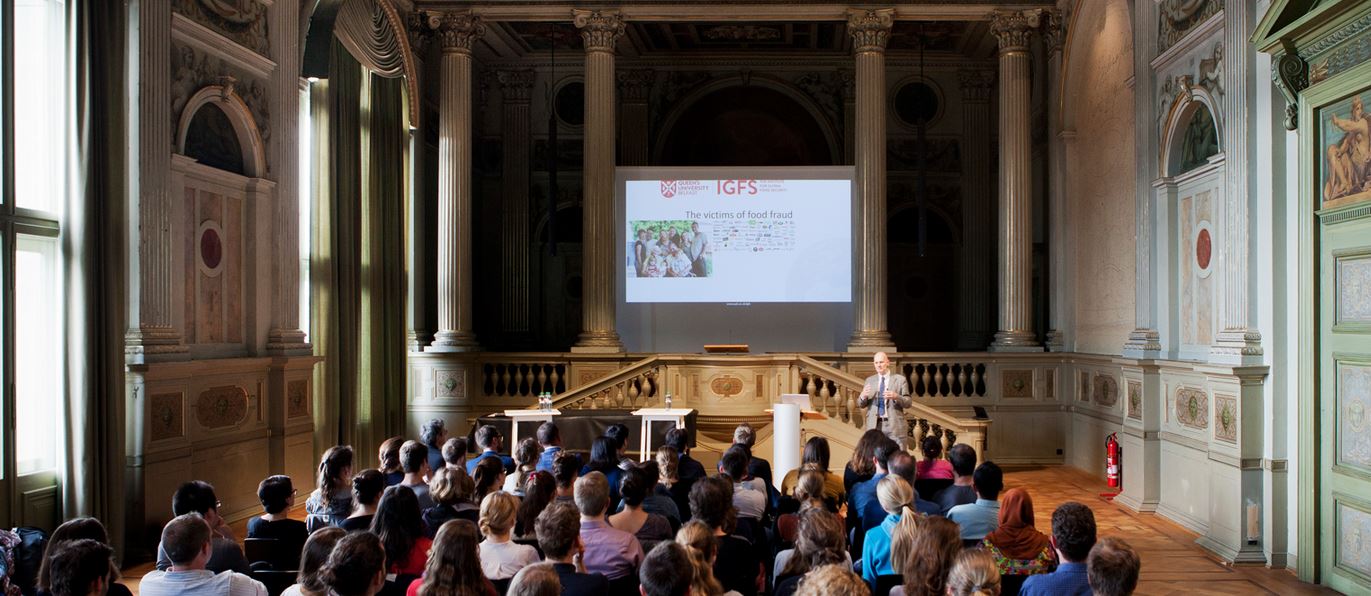FRAUD IN ORGANIC FOOD - KEYNOTE ADDRESS FROM PROFESSOR CHRIS ELLIOTT 
10 May 2018
Professor Chris Elliott, founder of the Institute for Global Food Security (IGFS) at Queen’s, gave the keynote address to an audience of 100 guests at ETH Zurich’s World Food System Center’s highly anticipated public lecture on food fraud on Thursday 26 April.
Faculty Pro-Vice-Chancellor of the School of Biological Sciences at Queen’s, Professor Elliott led the UK government’s independent review of food systems following the 2013 horsemeat scandal. The ability to provide safer food by using state-of-the-art monitoring tools is a major research driver of his work.
The World Food System Center (WFSC) is a competence centre at ETH Zurich that supports multi- and cross-disciplinary approaches to addressing the challenges confronting the world food system. The Center does this through research, education, and outreach activities that contribute to sustainable food and nutrition security.
Findings show that 6.5 million hectares of land were cultivated under organic management by almost 2.4 million producers in 2015. Global retail sales of organic products are now estimated at 75 billion Euros annually. Organic food is particularly susceptible to fraud as it is marketed at a higher price and is labelled to guarantee certain standards, while what makes it “organic” is not visible from the outside.
The organic sector is also consumer-driven, and so when scandals involving fraud occur, they undermine public confidence in organic labelling and hurt the market.
At the lecture in the Semper Aula at ETH Zurich Professor Elliott led the debate on fraud in organic food and how science can play a role in its detection and prevention.
Introducing instances of food fraud from around the world, Professor Elliott’s presentation focused on false organic food claims. He talked about how cutting-edge research performed at the IGFS is identifying fraud across the world – and working on ways to help prevent it – to safeguard citizens and prevent erosion of customer confidence in organic food.
Speaking after the event Professor Elliott said: “The main messages form the lecture were; how vulnerable food systems are to fraud; how widespread it is around the world; how especially difficult it is to detect fraud in organic food and how science can play an enormous role in detecting fraud and prevent it happening in the future.
“The organic food sector is growing globally at an impressive pace and is particularly susceptible to fraud,” he added. “We need to work to fight food criminals with science through detection, using numerous tools such as audits, inspections, and digital supply chains.
“New analytical techniques, such as metabolomics fingerprinting can be used to identify fraudulent products.”
Media inquiries to Queen’s University Communications Office tel: +44 (0)28 9097 3091.
Photo credit: Miriam Kuenzli
Back to Main News
Top of Page